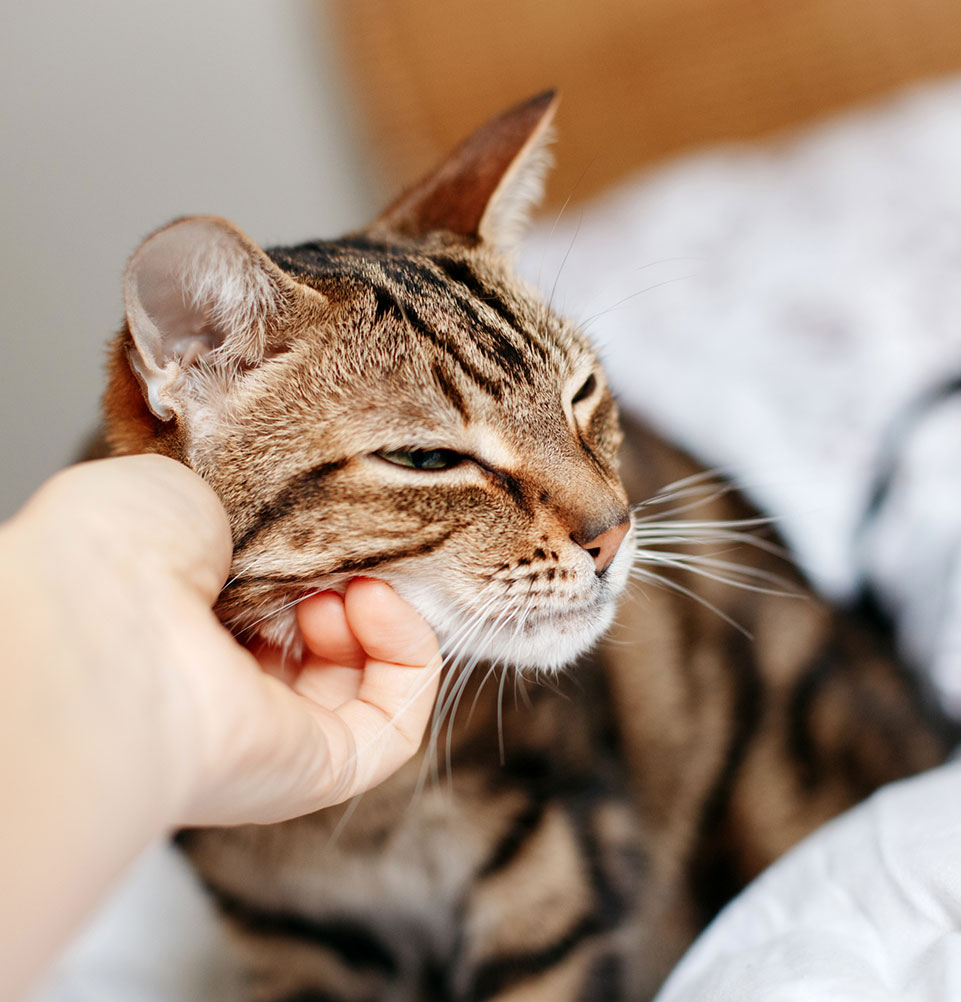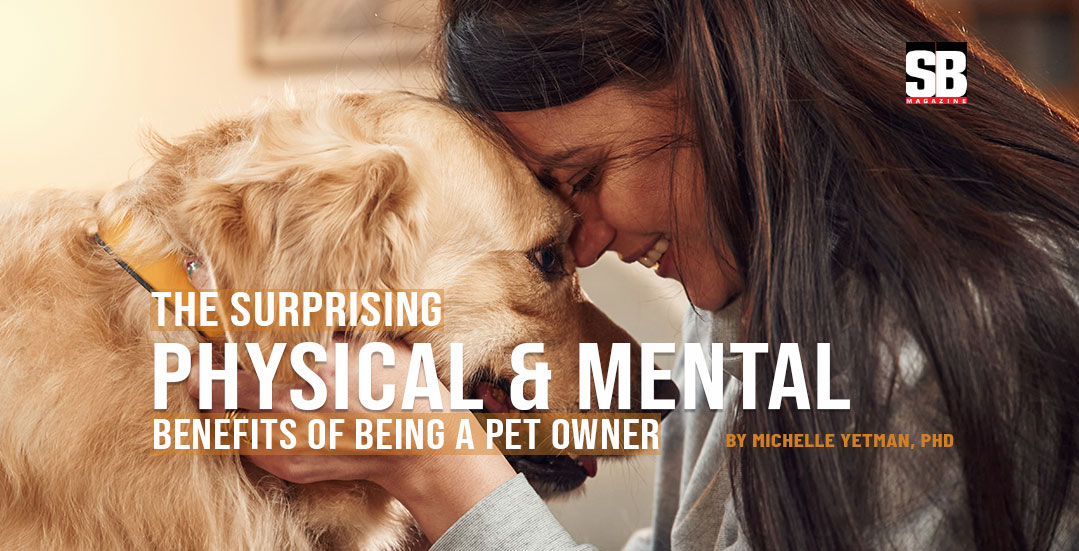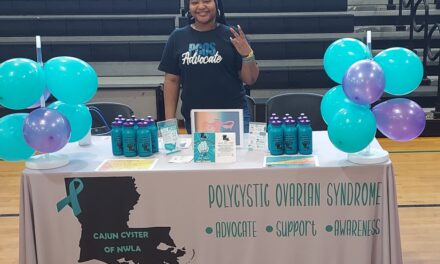Pet ownership soared during the pandemic and some shelters across the country found themselves empty of pets for the first time in history. Many people sought out the companionship of a pet to help manage the loneliness and isolation brought on by lockdown and the pandemic. For many people (and we know who we are), pets are much more than just animals – they are beloved family members. Pet ownership can provide a deep, meaningful connection with a living creature, and this special bond between pet and owner has numerous psychological and physical benefits. Numerous studies have shown that owning a pet can have a positive impact on mental and physical health and can help alleviate symptoms of anxiety, depression, and stress. Here are just a few of the many ways our furry friends can improve the quality of our lives:
- Reduction in stress and anxiety: Studies have shown that spending time with pets can help reduce stress and anxiety. The special bond you have with your pet can reduce feelings of anxiety and help cope with ailments that are exacerbated by stress. Pets provide a calming presence, and their unconditional love and affectionate behavior can help to lower levels of cortisol, a hormone that is associated with stress. Having that excited dog to greet you when you come home or having a warm fur baby to cuddle up with on the sofa can provide a sense of security and comfort and can help reduce feelings of anxiety. Tending to your pets feeding schedule, play time and grooming can provide a sense of routine, which also helps to alleviate anxiety.
- Improved mood and decreased depression: Pets can have a positive impact on our mood and mental state. Spending time with a pet can increase the production of endorphins, the brain’s feel-good chemicals, which can help to boost our mood and decrease feelings of depression. In addition, pets provide unconditional love and companionship, which can help to combat feelings of loneliness and isolation. Many people became new pet owners during the pandemic for this very reason. For individuals prone to mental health struggles, pets can provide a distraction and disruption from distressing symptoms, such as ruminating negative thoughts. Using animals to promote mental wellness has been formally adopted by hospitals, nursing homes and other facilities. Animal-Assisted Therapy or Pet-Facilitated Therapy (PFT) has been shown to be a valuable adjunct to traditional medical and psychological treatment approaches. Dogs, cats, rabbits, horses and even llamas have been used in pet-assisted therapy and have shown to have beneficial events in a wide range of conditions such as post-traumatic stress disorder (PTSD), depression, Alzheimer’s disease, dementia, and autism. There is some evidence to suggest that the human-animal bond may reduce the risk of suicide, a health threat that disproportionately affects U.S. military veterans.
- Increased socialization and sense of community: Pets can be a great way to meet new people and make friends. Whether it is taking a dog for a walk in the park or joining a cat-lovers group online, pets can provide opportunities for socialization and a sense of community. Dog parks are very friendly places, not just for the dogs, but for the humans as well. Meeting and chatting with fellow pet owners can help to combat loneliness and can be a great way to connect with others, especially for people who are shy, struggle with social anxiety or have a hard time making new friends. I have had some of the nicest conversations with strangers in the veterinarian’s waiting room. Most pet owners are happy to chat about their pet with others.
- Enhanced sense of purpose and responsibility: Pets are family members. Like humans, they need love, healthcare, feeding schedules and attention. Caring for a pet can provide a sense of purpose and responsibility. Pets are totally dependent on their owners, and taking care of them can provide a sense of accomplishment and fulfillment. Pets can be a great way to introduce chores and teach responsibility in children. Pets also provide children with opportunities to learn about demonstrating nurture and affection. A University of Cambridge study, which examined pet ownership and children over a 10-year time span, found that children who had a strong relationship with their pets exhibited higher levels of pro-social behavior (e.g., sharing, helping) in comparison to their peers.
- Increased physical activity: Many pets, such as dogs, require daily exercise. A Michigan Behavioral Risk Factor Survey found that approximately 60% of dog walkers met the criteria for regular moderate to vigorous exercise, in comparison to only 45% of non-dog owners. Having a cat or a dog has been shown to be beneficial for your blood pressure. Being a dog owner is associated with lower diastolic and systolic blood pressure. The National Health and Nutrition Examination study looked at pet ownership over a 20-year time span. The study of over 2,400 cat owners concluded that there was a significantly lower relative risk of death due to cardiovascular diseases, including stroke and heart attack, compared to non-owners. Pets can help us get regular exercise, and this has been shown to have numerous physical and psychological benefits.

The rewards provided by pets are too many to list. If you’ve had a tough day or a personal crisis, the unconditional love and support a pet can provide can be priceless. Many people report that their pets have helped them get through difficult times.
While pet ownership clearly has enormous benefits, it is not without commitment and challenges. Before getting a pet, carefully consider your lifestyle. Do you stay late at work? Do you travel often? Pets require time, attention, and financial resources. Make sure you are at the right point in your life to be able to responsibly take on a pet. A good fit between you and your pet can enhance your life immensely.
Michelle Yetman, PhD, is a Clinical Associate Professor at LSU Health Shreveport and a Clinical Psychologist for the Children’s Center at the LSUHS School of Allied Health Professions.









